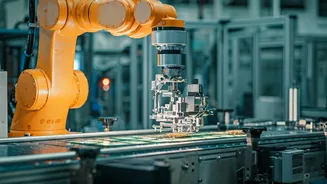AI's Growing Role
Amazon's decision to embrace Artificial Intelligence (AI) and integrate it into its operations signifies a significant shift in the tech industry. This
push towards AI isn't just a technological upgrade; it represents a fundamental change in how businesses operate and how they manage their workforce. AI's capabilities extend beyond automating routine tasks, promising to revolutionize various sectors. This includes optimizing supply chains, personalizing customer experiences, and improving operational efficiency. As AI technologies mature, they're becoming more integral to daily functions. It's predicted that businesses will need to adapt swiftly to maximize AI's potential and maintain their competitiveness. Amazon's strategic moves highlight the broader trend where AI becomes essential for growth and sustained success. This trend pushes other companies to rethink their strategies, and reassess their employees’ skill sets.
Layoffs Implications
The corporate layoffs announced by Amazon, stemming from its AI expansion, point to a significant restructuring within the company. This transformation impacts a considerable number of employees, potentially affecting their job security. This kind of restructuring may indicate a need for a workforce that possesses different skill sets or can adapt to new roles. Simultaneously, it could lead to increased pressure on employees to upgrade their skills and stay current with the fast pace of technological innovation. The human element of these changes cannot be overlooked. The layoffs signify that thousands of people might be affected and it could create stress on the job market and the broader economy. These changes necessitate a clear understanding of the evolving job landscape, along with active strategies for upskilling and career development. The impact highlights that the need for businesses and employees to adapt quickly.
Worker Adaptation Needed
To navigate the challenges created by AI-driven changes, employees must proactively take steps to adjust. This adaptation is crucial, and it requires both strategic upskilling and a willingness to embrace new technologies. Workers should seek opportunities to acquire expertise in areas that complement AI, such as data analysis, machine learning, and human-computer interaction. It's equally important to cultivate soft skills like critical thinking, creativity, and communication, which are not easily replicated by machines. Education becomes essential, and continuous learning is paramount. Embracing a growth mindset and being open to new roles and learning opportunities is critical. Staying informed about industry trends and seeking training programs that match the current market needs can significantly improve the employability of the employees and help the workers to contribute to a changing work environment.
Education's Pivotal Role
Educational institutions must rethink their curricula to support the changing requirements of the workforce. They play a vital role in providing the skills and knowledge needed for students to succeed in an AI-dominated world. It's imperative that schools and universities integrate AI-related subjects into their curriculum, focusing on practical skills and theoretical understanding. Educators need to encourage innovation and adaptation by providing programs that focus on future-ready skills. Collaboration between educational institutions and industries is essential to ensure that the curriculum is relevant and aligned with market needs. Practical training, internships, and apprenticeships should form a central part of education, providing the students with real-world exposure and practical skills. Education is vital in shaping a future-ready workforce, equipped to meet the changes that come with technological development.
Broader Societal Impacts
The integration of AI into the business world and the resulting job market restructuring have broader implications for society. These changes impact economic stability and also influence the distribution of wealth. It is important to promote measures that address income inequality and provide support to those affected by layoffs. Governments can play a key role by putting policies in place that promote reskilling and upskilling initiatives and by ensuring that there are social safety nets to aid workers during transitions. These policies should include investments in education, job training, and infrastructure. Ethical considerations are also vital. As AI grows more integrated, it is essential to discuss topics like data privacy, algorithm bias, and responsible AI deployment. This will ensure technology benefits society. By addressing these societal implications, it is possible to create a more inclusive and prosperous future, where technological innovation is combined with social responsibility.






















